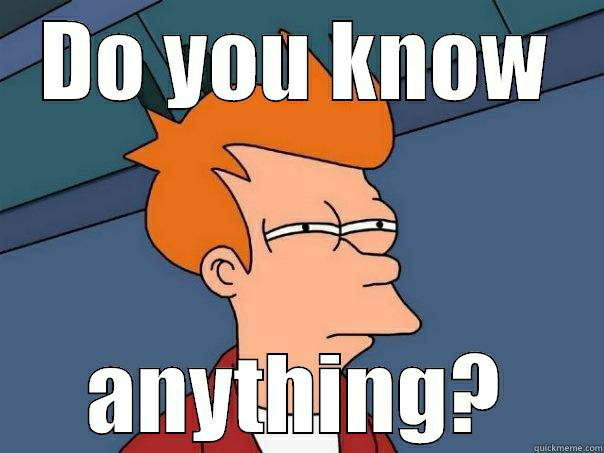As a result, we don't understand what does it mean to know something even beyond a certain age. Some people don't understand it in their entire lives. So philosophy seperates a special branch of itself to study the meaning of knowledge itself, viz. Epistemology.
Philosophers love precise definitions. Let's define some basic terms in this discipline.
Ok! Philosophers love to argue. Obviously, they argue better than scholars on internet or to be specific, trolls on Internet. The tools that philosphers have in an argument are with everybody. Philosphers just understand them better.
1) Assertion : Assertion is the linguistic act either written or spoken that possess some truth value.
2) Truth value : It is not a measure of extent of how much right an assertion is ; rather it is a black and white state of an assertion being true, false or indeterminate.
For instance, I am a boy is an assertion whose truth value can be established. But Am I a boy? is another linguistic act (questioning, let's say) but not an assertion.
Again, 'I am a boy' and 'मैं एक लड़का हूँ' are different assertions (because of different languages) possessing different propositions.
Proposition : It is the content of any assertion.
It is worth mentioning that attitude also counts while asserting something. Suppose I am telling you "I am a boy" but actually I am a girl but I just want to fool you. Something related to
Propositional Attitude : It is the mental state of the person asserting something.
In the case when I am really a girl but I am telling you that I am a boy, I have a "propositional attitude of disbelief".
On the contrary, there is something called propositional attitude of belief .
But It will also be worthwhile here to define Belief itself.
Belief : It is the propositional attitude of truth. I believe that I am a boy. This may be false. Obviously, Thinking and asserting something doesn't make it right. Also, I may have a propositional attitude of belief inside while asserting it and I still can be wrong.
What It takes for a belief to be a fact, it is the truth value of the assertions about the belief.
Here comes the big one!
Knowledge : Knowing something, in philosophical terms, means to have a justified true belief about that thing.
For instance, This is how life works. You are told that you were born on a particular date. What if your parents fooled you all the time telling you a false date?
That's a different thing. Basically, in life, we first start believing something despite it being true or false. Obviously we assume it to be true. Then we develop a propositional attitude of belief. We then justify the statements by checking it anyhow. May be looking at the birth certificate. There you go! Now you know that your birthday is on the dates that your parents told you. It is no longer your belief but is now in your knowledge. And you are (may be) not being fooled by your parents.
Justification basically is finding out the truth value of believed assertions. Here, let me clear one thing that we can't justify a belief directly without relying on assertions. On the contrary, our beliefs are said to be constituted in small propositions, which we express in assertions and whose justifications we find to commit it to our knowledge.
We say, If my belief corresponds to reality( an absolute forum of truth) , then my beliefs are true with respect to that absolute forum.
The deductive arguments we dealt with in previous blog of the Socratic method come under this process. One premise basically is an assertion and the other, a related assertion which justifies the conclusion.
How do we get justifications of beliefs
• But you were not that argumentative since birth. You first took the word for everything. This is said to be knowing something through Testimony. If the testimony was reliable, well Informed childhood. You took everyone's word for it when reading something, listening to a teacher etc.
• Inductive logic also works here. If I tell you that I have a pet and it is a dog. How do you justify that the pet that I am showing you in my backyard is really a dog? You have robust and well informed Beliefs about how a dog looks like. It is a first person observation about the dog, hence it is a dog.
Gettier Cases : the paper that shook philosophy.
So far so good! Now let's complicate it.Actually Edmund Gettier complicated this in the very first place. He proposed that sometimes Beliefs can be justified but they need not be knowledge.
In other words, he is actually saying that the definition of knowledge that philosophers believed for so long to be right was wrong.
This, he called the Gettier cases. I call it, Coincidence cases (instances where people being true coincidently about their beliefs)
For example, It is very common in India that when you are going to give an exam, your religious parents will give you Jaggery mixed with Curd to taste so that you get good marks in the exam. This is a kind of a ritual.
Now even if you got good marks, will you say that this is because you ate Curd-Jaggery before exam? Of course, you can! Either in love of your parents or in love of the culture or ritual or religion, but is it truly the case? No! It is just a coincidence that you got good marks and you ate that before exam. Howsoever times you get the evidence of this ritual being justified, you brother, your friend all of them eating Jaggery mixed with Curd before exam and getting good marks, this Justified true belief can never be knowledge.
And be careful because every religious ritual is basically a potential fool box, it can turn into a Gettier case and can fool you. Remember,
Coincidences don't count in justifications!
This turned the philosophy discipline upside down.
So, Knowledge is not a justified true belief. So, what is knowledge? Debates are going on till date.
So, let's keep this concise here. In next blog, we enter the world of Karl popper who first made the distinction between Sciences and Pseudosciences.
Keep Reading! Keep doubting! The only Salvation is in reading!
Ok then! See you in the next blog!
















































